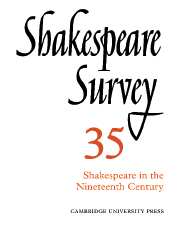Book contents
- Frontmatter
- Before the Shakespeare Revolution: Developments in the Study of Nineteenth-Century Shakespearian Production
- The Meininger Company and English Shakespeare
- Shakespeare at the Burgtheater: From Heinrich Anschütz to Josef Kainz
- Shakespeare on the Melbourne Stage, 1843-61
- Shakespeare in Hazlitt’s Theatre Criticism
- Characterization of the Four Young Lovers in A Midsummer Night’s Dream
- Queenly Shadows: On Mediation in Two Comedies
- Language, Theme, and Character in Twelfth Night
- The Art of the Comic Duologue in Three Plays by Shakespeare
- ‘Spanish’ Othello: The Making of Shakespeare’s Moor
- Ferdinand and Miranda at Chess
- Shakespeare’s Latin Citations: The Editorial Problem
- The Theatre at Christ Church, Oxford, in 1605
- Interpretations of Shakespearian Comedy, 1981
- The Year's Contributions to Shakespearian Study 1 Critical Studies
- 2 Shakespeare’s Life, Times and Stage
- 3 Textual Studies
- Index
- Plate Section
Shakespeare in Hazlitt’s Theatre Criticism
Published online by Cambridge University Press: 28 March 2007
- Frontmatter
- Before the Shakespeare Revolution: Developments in the Study of Nineteenth-Century Shakespearian Production
- The Meininger Company and English Shakespeare
- Shakespeare at the Burgtheater: From Heinrich Anschütz to Josef Kainz
- Shakespeare on the Melbourne Stage, 1843-61
- Shakespeare in Hazlitt’s Theatre Criticism
- Characterization of the Four Young Lovers in A Midsummer Night’s Dream
- Queenly Shadows: On Mediation in Two Comedies
- Language, Theme, and Character in Twelfth Night
- The Art of the Comic Duologue in Three Plays by Shakespeare
- ‘Spanish’ Othello: The Making of Shakespeare’s Moor
- Ferdinand and Miranda at Chess
- Shakespeare’s Latin Citations: The Editorial Problem
- The Theatre at Christ Church, Oxford, in 1605
- Interpretations of Shakespearian Comedy, 1981
- The Year's Contributions to Shakespearian Study 1 Critical Studies
- 2 Shakespeare’s Life, Times and Stage
- 3 Textual Studies
- Index
- Plate Section
Summary
Our two first important theatre critics are also two of the best: Leigh Hunt and William Hazlitt. Hazlitt, born six years before Hunt, started to write theatre criticism after Hunt, and ended before him. So his career is, in a sense, included within Hunt’s; and it touches his at some points. Hazlitt started as critic of the Morning Chronicle, a daily paper, in 1813, by which time he was already a seasoned playgoer. He had settled in London the previous year, and had been writing parliamentary reports and political articles for that paper. He stayed with the Morning Chronicle till May 1814, and from August of that year till the following January wrote regular theatre criticism for a weekly paper, The Champion; in March 1815 he became the regular theatre critic for the Hunts’ paper The Examiner – Leigh Hunt was in prison. He continued to write frequently for The Examiner, sharing the task with Hunt after his release, till June 1817. He then wrote for The Times from June 1817 till about April 1818. This five-year period is the most fruitful and important in his career as a theatre critic, though in 1820 he wrote a series of monthly articles about the drama for the London Magazine. These are long essays which include only a comparatively small proportion of immediate (as opposed to retrospective) theatre reviewing. Hazlitt’s career as a reviewer ends with a short spell on The Examiner again in 1828.
- Type
- Chapter
- Information
- Shakespeare Survey , pp. 43 - 56Publisher: Cambridge University PressPrint publication year: 1982

